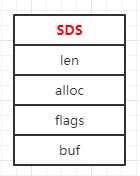1
2
3
4
5
6
7
8
9
10
11
12
13
14
15
16
17
18
19
20
21
22
23
24
25
26
27
28
29
30
31
32
33
34
35
36
37
38
39
40
41
42
43
44
45
46
47
48
49
50
51
| sds sdsnewlen(const void *init, size_t initlen);
sds sdsnew(const char *init);
sds sdsempty(void);
sds sdsdup(const sds s);
void sdsfree(sds s);
sds sdsgrowzero(sds s, size_t len);
sds sdscatlen(sds s, const void *t, size_t len);
sds sdscat(sds s, const char *t);
sds sdscatsds(sds s, const sds t);
sds sdscpylen(sds s, const char *t, size_t len);
sds sdscpy(sds s, const char *t);
sds sdscatvprintf(sds s, const char *fmt, va_list ap);
#ifdef __GNUC__
sds sdscatprintf(sds s, const char *fmt, ...)
__attribute__((format(printf, 2, 3)));
#else
sds sdscatprintf(sds s, const char *fmt, ...);
#endif
sds sdscatfmt(sds s, char const *fmt, ...);
sds sdstrim(sds s, const char *cset);
void sdsrange(sds s, ssize_t start, ssize_t end);
void sdsupdatelen(sds s);
void sdsclear(sds s);
int sdscmp(const sds s1, const sds s2);
sds *sdssplitlen(const char *s, ssize_t len, const char *sep, int seplen, int *count);
void sdsfreesplitres(sds *tokens, int count);
void sdstolower(sds s);
void sdstoupper(sds s);
sds sdsfromlonglong(long long value);
sds sdscatrepr(sds s, const char *p, size_t len);
sds *sdssplitargs(const char *line, int *argc);
sds sdsmapchars(sds s, const char *from, const char *to, size_t setlen);
sds sdsjoin(char **argv, int argc, char *sep);
sds sdsjoinsds(sds *argv, int argc, const char *sep, size_t seplen);
sds sdsMakeRoomFor(sds s, size_t addlen);
void sdsIncrLen(sds s, ssize_t incr);
sds sdsRemoveFreeSpace(sds s);
size_t sdsAllocSize(sds s);
void *sdsAllocPtr(sds s);
void *sds_malloc(size_t size);
void *sds_realloc(void *ptr, size_t size);
void sds_free(void *ptr);
|
